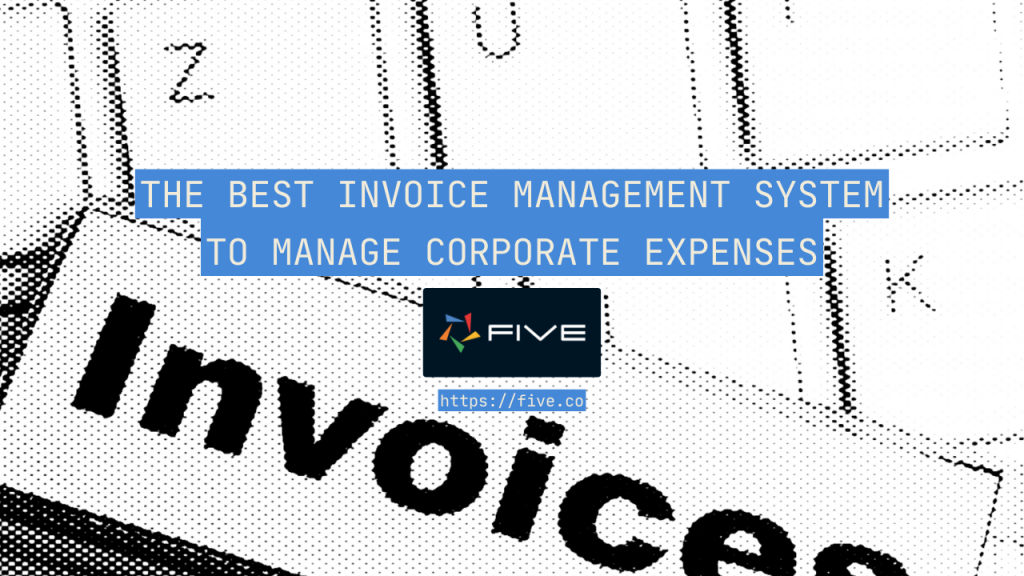The Best Invoice Management System to Manage Corporate Expenses

Overview
What Is an Invoice Management System?
An invoice management system is a tool that automates and simplifies the process of creating, sending, and tracking invoices for businesses. It helps manage billing and payment processing, improve financial accuracy, and enhance overall invoicing efficiency. Having an online invoice management system is essential for any business operation that wants to save time and money.
A good system will automate the generation of invoices and provide a range of features to enhance accuracy and compliance. In this article, we will discuss the key features of an invoice management system, its benefits, and how to choose the right one for your organization’s needs.
Key Features of an Invoice Management System
An invoice management system can help you get paid faster by simplifying your invoicing process and ensuring timely payments. Unlike off-the-shelf invoicing solutions, a bespoke system can be tailored to your specific business requirements, allowing you to prioritize building the most important features.
With automation at the heart of the system, your team will be freed from the burden of manual data entry and calculations. Add in customizable templates to create tailored invoices that accurately reflect your brand’s identity. Seamless integration with your external accounting data using REST API ensures a smooth flow of financial data, reducing errors and discrepancies. Additionally, advanced tracking capabilities provide real-time visibility into invoice statuses, allowing you to make informed decisions faster.
Here are some examples of different types of invoicing systems and their features:
Vendor Invoice Management System
- Invoice Approval Workflow: Streamlines the approval process by routing invoices through the appropriate channels, ensuring they are reviewed and approved before payment.
- Vendor Portal: Provides a platform for vendors to submit their invoices, track payment status, and possibly set reminders and notifications to the accounts payable team.
- Invoice Matching: Matches invoices with purchase orders and delivery receipts, ensuring accuracy and avoiding overpayment or duplication.
- Vendor Performance Evaluation: Dashboards for tracking and evaluating a vendor’s performance based on metrics such as invoice accuracy, timeliness, and compliance with contract terms.
Supplier Invoice Management System
- Supplier Relationship Management (SRM): Focuses on building and maintaining strong relationships with suppliers, involving aspects beyond invoicing such as contract management and communication.
- Supplier Onboarding and Evaluation: Streamline the process of onboarding new suppliers, including verification, compliance checks, and contract negotiation.
- Document Management: Provides a centralized repository for all supplier-related documents, including contracts, agreements, invoices, and communications.
- Compliance and Risk Management: Helps in monitoring and ensuring supplier compliance with contractual terms, as well as managing risks associated with supplier relationships.
Other common features include invoice processing, payment tracking, automation, reporting, and payment processing.
When selecting invoice management software, it’s important to prioritize features that automate unproductive and costly processing steps, simplify processes, increase productivity and efficiency, and lower costs.
Here’s a simple checklist to guide you in choosing the best Invoice Management System for your business:
- Ease of Use: A user-friendly interface is key. The system should be intuitive, allowing for easy navigation and minimal training time for your team.
- Feature Assessment: Evaluate the system’s features against your specific requirements. Additionally, review the provider’s development roadmap to ensure future needs will be met.
- Seamless Integration: Compatibility with existing systems, such as accounting software, is vital. This integration eliminates manual data entry, saving time and reducing the risk of errors.
- Cost Consideration: While upfront costs are significant, it’s crucial to weigh them against the long-term benefits. A reasonable pricing structure aligned with your budget is essential.
- Robust Security Measures: Handling financial data demands robust security. Ensure the software employs advanced encryption and access controls to safeguard sensitive information.
- Responsive Customer Support: A responsive support team is invaluable. They should be accessible and equipped to address any queries or challenges promptly.
- Automation Capabilities: A sophisticated invoice management system should offer advanced workflow management. This empowers you to automate manual processes, significantly enhancing efficiency.
By carefully evaluating these factors, you will be well-equipped to make an informed decision when choosing an invoice management system. Keep in mind that the right system is not just a tool, but rather an investment for your business.
Benefits of Building an Automated Invoice Management System
Adopting an online invoicing solution can improve a company’s efficiency and bottom line by reducing the likelihood of human error, resulting in more accurate, compliant invoices. This increased precision saves time and costs while allowing businesses to allocate resources more strategically. But it is usually difficult to find one that has all the features that you need, most of the time you spend more time trying to make an existing off-the-shelf solution work for your business and end up wasting time and money.
By building a tailored invoice management system, you can establish a strong compliance and audit trail, providing confidence to stakeholders and managing risks. Streamlined workflows and approval processes further expedite the revenue cycle, creating a dynamic and agile financial ecosystem.
Some other benefits include the ability to extract relevant data from invoices, reducing the risk of errors, and saving time. It also allows for customized approval workflows, consolidation of multiple invoices, and splitting of one invoice into multiple invoices, providing flexibility and control over the invoicing process.
Most importantly matching invoices with purchases, sales orders, and payments ensures that payments are made only for approved invoices, reducing the risk of fraud and errors. You would also be able to synchronize company accounts to transfer payments for approved invoices, further simplifying the payment process.
Introducing Five: Web Application Builder
Five is a rapid application development environment that helps software developers build, test, and deploy modern, data-driven business applications such as invoice management systems.
It comes with a built-in MySQL database, and it can also connect to any external relational data source. Once connected to a data source, Five can be used to create user-friendly, bespoke web applications quickly. One of Five’s biggest advantages is its auto-generated UI options that make it extremely easy to go from database to application.
Some of the typical applications you can build using Five are admin panels, CRUD applications, data analysis tools, customer portals, time tracking apps, and many other B2B applications.
You can grab the free download of Five for your local machine to develop and test applications with no time limit. Once you’ve built a production-worthy application, you can sign up for a paid subscription to deploy it to the cloud.


